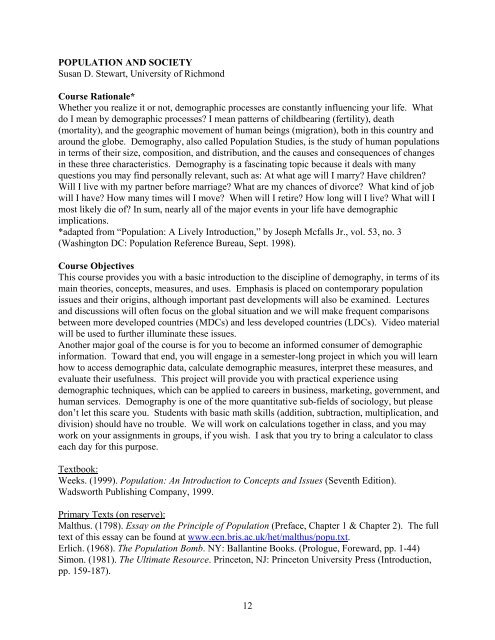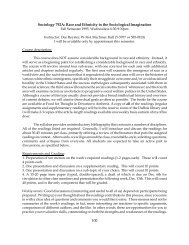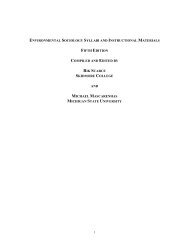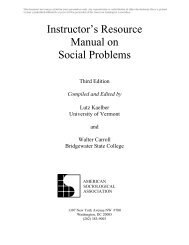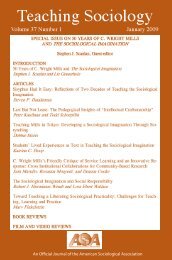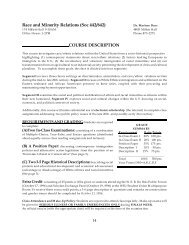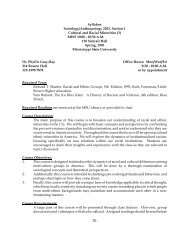Demography - American Sociological Association
Demography - American Sociological Association
Demography - American Sociological Association
Create successful ePaper yourself
Turn your PDF publications into a flip-book with our unique Google optimized e-Paper software.
POPULATION AND SOCIETY<br />
Susan D. Stewart, University of Richmond<br />
Course Rationale*<br />
Whether you realize it or not, demographic processes are constantly influencing your life. What<br />
do I mean by demographic processes? I mean patterns of childbearing (fertility), death<br />
(mortality), and the geographic movement of human beings (migration), both in this country and<br />
around the globe. <strong>Demography</strong>, also called Population Studies, is the study of human populations<br />
in terms of their size, composition, and distribution, and the causes and consequences of changes<br />
in these three characteristics. <strong>Demography</strong> is a fascinating topic because it deals with many<br />
questions you may find personally relevant, such as: At what age will I marry? Have children?<br />
Will I live with my partner before marriage? What are my chances of divorce? What kind of job<br />
will I have? How many times will I move? When will I retire? How long will I live? What will I<br />
most likely die of? In sum, nearly all of the major events in your life have demographic<br />
implications.<br />
*adapted from “Population: A Lively Introduction,” by Joseph Mcfalls Jr., vol. 53, no. 3<br />
(Washington DC: Population Reference Bureau, Sept. 1998).<br />
Course Objectives<br />
This course provides you with a basic introduction to the discipline of demography, in terms of its<br />
main theories, concepts, measures, and uses. Emphasis is placed on contemporary population<br />
issues and their origins, although important past developments will also be examined. Lectures<br />
and discussions will often focus on the global situation and we will make frequent comparisons<br />
between more developed countries (MDCs) and less developed countries (LDCs). Video material<br />
will be used to further illuminate these issues.<br />
Another major goal of the course is for you to become an informed consumer of demographic<br />
information. Toward that end, you will engage in a semester-long project in which you will learn<br />
how to access demographic data, calculate demographic measures, interpret these measures, and<br />
evaluate their usefulness. This project will provide you with practical experience using<br />
demographic techniques, which can be applied to careers in business, marketing, government, and<br />
human services. <strong>Demography</strong> is one of the more quantitative sub-fields of sociology, but please<br />
don’t let this scare you. Students with basic math skills (addition, subtraction, multiplication, and<br />
division) should have no trouble. We will work on calculations together in class, and you may<br />
work on your assignments in groups, if you wish. I ask that you try to bring a calculator to class<br />
each day for this purpose.<br />
Textbook:<br />
Weeks. (1999). Population: An Introduction to Concepts and Issues (Seventh Edition).<br />
Wadsworth Publishing Company, 1999.<br />
Primary Texts (on reserve):<br />
Malthus. (1798). Essay on the Principle of Population (Preface, Chapter 1 & Chapter 2). The full<br />
text of this essay can be found at www.ecn.bris.ac.uk/het/malthus/popu.txt.<br />
Erlich. (1968). The Population Bomb. NY: Ballantine Books. (Prologue, Foreward, pp. 1-44)<br />
Simon. (1981). The Ultimate Resource. Princeton, NJ: Princeton University Press (Introduction,<br />
pp. 159-187).<br />
12


